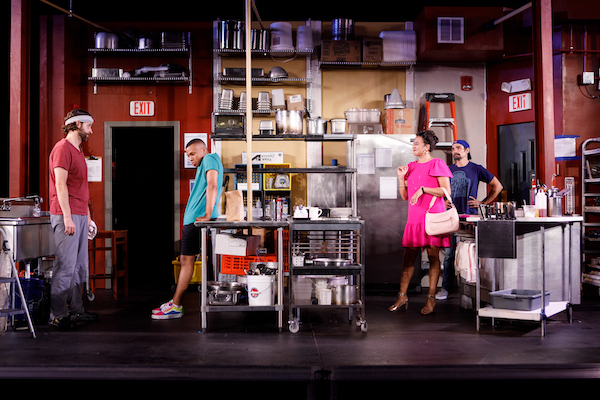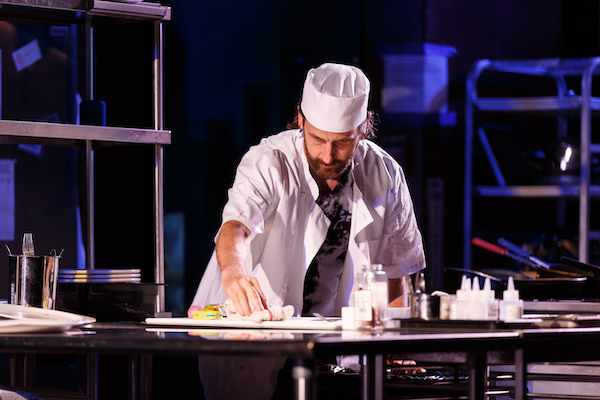Theater Review: “Seared” — A Recipe for Comedy
By David Greenham
Theresa Rebeck’s foodie comedy Seared is more of an amiable appetizer than a substantial entree.
Seared by Theresa Rebeck. Directed by Victoria Gruenberg. Scenic design by Anya Klepikov. Costume design by Kathleen Doyle. Lighting design by Aja M. Jackson. Sound design by Stan Mathabane. Staged by Gloucester Stage, performed outdoors at Windhover Center for the Performing Arts, Rockport, MA, through August 22.

l to r: James Louis Wagner, Jordan Pearson, Emily Bosco, and Matt Monaco in a scene from the GSC production of Seared. Photo: Jason Grow
If you’ve jumped on the foodie bandwagon, you have undoubtedly feasted on the “inside the kitchen ego” drama served up by Top Chef, Master Chef, and other dishes on the reality television smorgasbord.
In Seared, dramatist Theresa Rebeck (Seminar, The Understudy, Bernhardt/Hamlet, and others) seizes on the fad, setting her play in the kitchen of a tiny two-year-old Park Slope restaurant. This humble but ambitious eatery is a partnership between the well-meaning Mike (Matt Monaco), who has invested all of his cash into the venture, and the self-celebratory chef Harry (James Louis Wagner), who is certain that he’s doing Mike and the world a favor by placing his works of art on a plate.
Harry lives to lecture others, expounding on the importance of food while underlining the limitations of nearly everything else. Early on, he tells Mike and Rodney (an excellent Jordan Pearson), the wait person and sometime kitchen assistant, that “there are not an infinite amount of things you can do in your life.” Unless you’re a wonderful cook, of course. His next declaration is, “There are infinite numbers of doors you can open with butter.”
It turns out that one of Harry’s buttered doors is his seared scallops, which had been featured on the menu since the restaurant opened. One evening, Harry’s delicious mollusks caught the eye of a New York magazine writer, who put the dish in the publication’s weekly “best bets” feature. Predictably, diners flocked to Brooklyn to have a taste. In response, Harry, following what appears to be a self-destructive pattern, decides that the scallops he was getting each morning from the fish market are no longer up to his standards. So he takes the dish off the menu.
Mike sees an opportunity to improve cash flow slip away, while Rodney is stuck dealing with an endless stream of dissatisfied customers. Harry, ever on his soap box, believes the only food that matters is what he’s cooking at the moment. The scallops debacle sets up the drama’s major conflict. Instead of skewering Harry, Mike invites self-confident consultant Emily (Emily Bosco) to remake the restaurant. It will be a win-win: financial success for the eatery while Harry will get the recognition he claims he deserves.
That’s when the simmering pot begins to boil over.
Rebeck’s sometimes amusing comic drama examines the high price demanded by the quest for perfection. Predictably, Harry resists nearly every suggestion Emily makes for bringing in more cash. Eventually, Mike is forced to share the truth about the restaurant’s razor-thin profit margin: “If they raise the rent, we lose everything. That’s the reality.” Harry retorts, with crushing brutality, “The food is the reality.”
Gloucester Stage has created an effective partnership with the idyllic Windhover Center for the Performing Arts in Rockport, which is presenting the company’s shows this summer in its natural outdoor amphitheater. Of course, production values needn’t be skimped on because the show is outdoors — and they aren’t, here.
For Seared, set designer Anya Klepikov and props designer Lauren Corcuera have created a remarkable facsimile of a working restaurant kitchen. Every nook and cranny of the space is filled — from floor to imaginary ceiling — with all the accoutrements any foodie would expect to find in a cramped commercial kitchen. With the help of chef consultant Neil Maver, Wagner and Pearson enact legitimate-looking prep and cooking chores. Even the stove top works. If the show had been staged inside a theater, I suspect the GSC would have made good use of the smells of cooking and the sizzle of a searing piece of fish or meat.

James Louis Wagner cooking up something good in GSC’s production of Seared. Photo: Jason Grow
Director Victoria Gruenberg manages to keep the performers moving around and about Wagner’s animated (by him) cooking space. The most difficult challenge, in terms of performer interaction, is posed by the conflict’s lopsided nature. On the one hand, Monaco’s Mike and Bosco’s Emily are mostly tasked with standing and talking. On the other, there’s Wagner’s Harry, who is cooking away — though Rebeck gives Harry plenty of time to pontificate as well.
The imbalance between talkers and star cooker is evident in other aspects of the script. Mike is consumed with worry, but it’s unclear what, besides money, he brings to the partnership. Emily bases her spending on airy speculations — without betraying any anxiety. At one point, she aptly articulates Seared’s central ambiguity. Is Harry a gifted chef who needs to learn more about how the business of cooking works? Or is he “just an asshole with some talent?” Rebeck doesn’t provide any answers; in fact, she barely seems interested in asking any serious questions.
Kathleen Doyle’s costumes are functional. They reflect the passage of time but come off as undernourished. Also, Stan Mathabane’s sound design or rather, sound designs, don’t seem to match up. Pleasing and familiar songs are played during the preshow and intermission. But some of the transition tunes, along with the music he supplies during a scene in which the chef is quietly creating a signature dish, don’t feel appropriate to the spirit of the production.
Gloucester Stage Company’s cast members manage to maneuver themselves through several courses of Seared with gustatory skill. But Rebeck’s script is more of an amiable appetizer than a substantial entree.
David Greenham is an adjunct lecturer of Drama at the University of Maine at Augusta, and is the executive director of the Maine Arts Commission. He has been a theater artist and arts administrator in Maine for more than 30 years.
